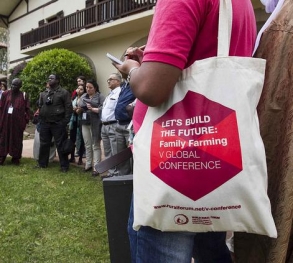More than 200 representatives from all over the world took part at the V Global Conference held on the 21st, 22nd ,23rd September 2015 in Derio, Bizkaia.
Monday, 5th of October 2015, Derio. The need to create institutional spaces to promote participative political dialogue arose during the 5th Global Conference of the World Rural Forum, a dialogue that must include Family Farming organizations and, specially, young people and women. Representatives from governments, agricultural organizations, international agencies (like FAO and IFAD), National Committees of Family Farming, rural development associations, NGOs and research centers met at the conference.
“We must improve agrarian representation in the governments, maintain the interinstitutional networks and strengthen them at local, regional and international levels, promoting the integration of young people and women in the participative processes. We must also establish relationships with academies, research centers, etc., that will provide political training and qualification to the peasant leaders”, remarked Auxtin Ortiz, World Rural Forum´s director.
Not only the search of political dialogue to create public policies promoting Family Farming, peasant farming, traditional, fishing, pastoralism and indigenous communities was addressed. Topics ranging from the creation of global guidelines for the regulation of agrarian models based on Family Farming to the connection between Family Farming organizations and research centers were analyzed by working groups where members of the farming sector from all over the world took part actively.
The working group analyzing the contents and direction of the global guidelines underlined the importance of recognizing Family Farming as a mean of livelihood because of its fundamental role, among other factors, in the rural and regional development. The relevance of promoting more participative processes involving egalitarian economic, political and social rights was also stressed by this group.
Analyzing how to improve the connection between agricultural organizations and research centers, the participants realized that it was necessary to improve the communication processes and strengthen the already existing relationships. The working group members also asked the men and women family farmers to be more active in the identification and systematization of their good practices.
Besides the working groups, the 5th Conference held panel discussions on the following topics: communication to promote Family Farming, young people and employment in the rural areas and the role of women in Family Farming.
The 5th Global Conference of the World Rural Forum, “Let´s Build the Future, Family Farming”, analyzed the advances in the characterization of this agricultural model and proposed dialogue mechanisms to improve work conditions and well-being of the men and women in Family Farming. Different proposals to connect agricultural research with the relevant peasant organizations were put forward also. Therefore, it is an opportunity to exchange ideas and examples of specific Family Farming policies and analyze how a better future can be built for the millions of men and women farmers all over the world.
IYFF+10, Global Impulse to Family Farming Campaign
After achieving remarkable results during the International Year of Family Farming IYFF-2014 (celebration that was preceded by an intense World Rural Forum´s campaign), the main objective of IYFF+10 will be to continue improving public policies supporting Family Farming. Although this recently launched campaign is a broad initiative, IYFF+10 relies on three key areas: promotion of the National Committees of Family Farming, definition of the global guidelines for Family Farming and encouragement of participative research.
As happened during the International Year, the IYFF+10 will always seek maximum cooperation and spirit of understanding between farmers’ organizations, rural associations, research centers, governments and international institutions.



